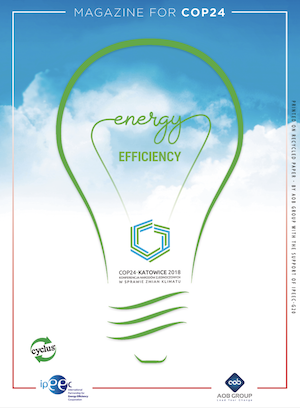Energy Efficiency Magazine for COP 24
Katowice 2018

Whereas the climatic events planned by the world experts become clearer every year even with an alarming acceleration, some, called climate change skeptics, challenge the policies established by their predecessors. The energy transitions which rely on renewable energies and on energy efficiency demand long-term policies and cannot be questioned on every election.
Saïd MOULINE

Ecler ivoire project
Cutting 30% of co2- emissions in constructions – while improving quality and lowering cost
Energy performance contracting : a spark for energy efficiency market ignition in Africa
Making trucks cleaner in the g20 : experiences from the us, eu and international collaboration
Mexico is on the way to achieving sustainable housing through the sustainable improvement in existing housing initiative
“China energy efficiency report”- advancing energy efficiency through a holistic approach
Guidelines for evaluating energy efficiency policies and outcomes
South Africa’s appliance energy efficiency label : how we are increasing consumer awareness
Behavioural change : unlocking energy productivity through ep100
Energy efficiency in Cote d’Ivoire : pioneer in the south-south cooperation
Blockchain technology brings innovative ways to achieve energy efficiency
The capital role of measurement and verification (m&v) to unlock the full potential of energy efficiency
Even as climate emissions push planet toward 1.5°c limit, we can still avoid up to 1°c of future warming – from our air conditioners
Keeping your cool
By Rachel Kyte, Chief Executive Officer of Sustainable Energy for All (SEforALL)
An inefficient truth
Mainstreaming Energy Efficiency Experience from the European Bank for Reconstruction and Development
The Sustainable Sydney 2030 Strategy
Energy efficiency sustainability and human behaviour : the importance of international cooperation in the G20 and beyond
Energy efficiency is the cornerstone of a global response to the climate challenge
EDITO – ENERGY TRANSITION : A LONG-TERM POLICY

EDITO
Whereas the climatic events planned by the world experts become clearer every year even with an alarming acceleration, some, called climate change skeptics, challenge the policies established by their predecessors. The energy transitions which rely on renewable energies and on energy efficiency demand long-term policies and cannot be questioned on every election.
A phenomenon that provides glimmers of hope is the cost of produced energies from renewable resources which continues its already dazzling decrease. Nowadays, the least expensive way of producing electricity is through photovoltaic power generation. Wind energy comes in second place. Some industrialists implemented energy efficiency measures while producing with renewable energies and that, successfully resulted in a drastic drop of their energy bill whilst reducing their greenhouse gas emissions.
This applies for the industrialists, but is also becoming more and more attractive to households, cities and rural communities. The evolution in energy storage, whose cost also decrease, shows that new environmental and economic solutions will be implemented to supply energy without any wasting while being consumed, especially on our continent where still 600 million inhabitants have no access to electricity.
Saïd MOULINE

